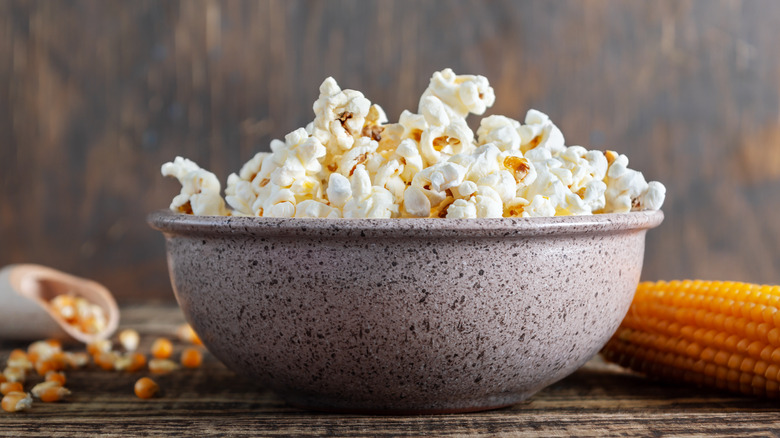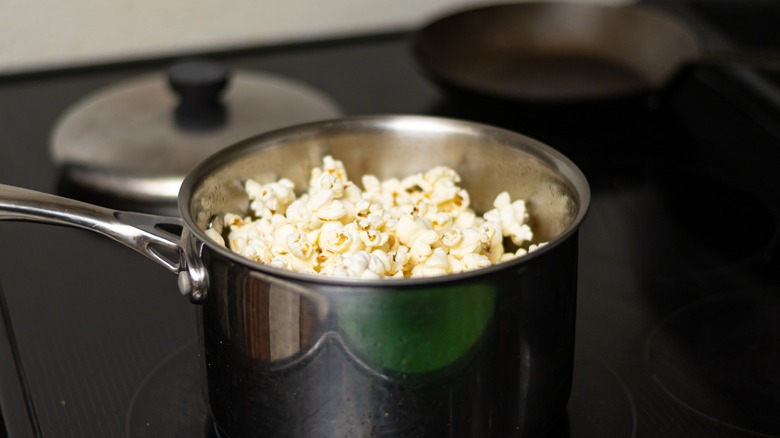The Hidden Nutritional Benefit Popcorn Has Over Fruits And Vegetables
Popcorn is a hard food to escape. It shows up when you're at a movie theater with friends, it's served as a snack on board game night, and you may even have some bags of it hidden somewhere in a cupboard at home.
But unlike most other party treats, popcorn actually has some health benefits. According to the U.S. Department of Agriculture, a serving of 100 grams of popcorn has 12.9 grams of protein, 14.5 grams of fiber, and 329 milligrams of potassium. Popcorn is also 100% whole grain unlike most other snacks, which makes it a rich source of fiber. But there's something popcorn has in higher concentration than even fruits and vegetables, according to scientists: polyphenols.
Joe Vinson, Professor of Chemistry at the University of Scranton in Pennsylvania, reported the findings of a 2019 study on the unexpected health benefits of popcorn. According to Vinson, the antioxidant-rich polyphenols are far more concentrated in popcorn because it has only about 4% water, as opposed to fruits and vegetables that contain 90% water (via Science Daily). Additionally, the hulls of popcorn are what Vinson called "nutritional gold nuggets," because they're packed full of polyphenols and fiber. According to the study, one serving of popcorn contains up to 300 milligrams of polyphenols when compared with fruits that came up to 160 milligrams and sweet corn that rounded up at 114 milligrams.
What do polyphenols do?
Polyphenols, which act as antioxidants, reduce inflammation in the body. They also promote circulation and good digestive health (via Prevention).
"Polyphenols are a category of compounds naturally found in plant foods, such as fruits, vegetables, herbs, spices, tea, dark chocolate, and wine," shared registered dietitian Alina Petre via Healthline. In addition to combating inflammation, "they can neutralize harmful free radicals that would otherwise damage your cells and increase your risk of conditions like cancer, diabetes, and heart disease," added Petre.
If you want to promote gut health, boost your brain's memory function, lower blood sugar levels, and work toward protecting yourself from heart disease, popcorn might not be a bad snack to munch on. But it's important to understand that while the whole grain snack in its true form could offer hidden health benefits, slathering popcorn with salt, butter, or sugary sauces will defeat the purpose. So can eating too much popcorn. According to Vinson (via Science Daily), "Air-popped popcorn has the lowest number of calories ... Microwave popcorn has twice as many calories as air-popped, and if you pop your own with oil, this has twice as many calories as air-popped popcorn." He also said that fat comprises 43% of microwave popcorn, versus 28% when you pop your own in oil.
What's the best way to eat popcorn?
The healthiness of popcorn really comes down to how you make it. Something you won't find in store-bought popcorn is a control on sugar, salt, or butter. So the best way to consume this nutritional food is to either make it yourself using an air popper machine (if you have one) or go the traditional route and make some popcorn over the stove.
You don't have to completely leave out salt or oil (unless you're trying to cut back), according to registered dietitian Paula Doebrich (via Shape). Opt for healthier oils like avocado. "Fats with a lower smoke point, such as coconut oil or butter, may not be ideal for the high heat [that is produced] when making popcorn on the stovetop," she added. As for salt, Doebrich recommends using 1/2 teaspoon per three cups of popped popcorn. The great thing about making your own popcorn is that you get to experiment with different kinds of popcorn kernels and toppings. You can keep it sugary but healthy with options like dark chocolate and dried fruit, or go savory with spices and herbs of your choice.
While the hidden nutritional benefit of polyphenols in popcorn is something to be happy about, it doesn't mean you can skip your fruits and vegetables. In fact, fruits and veggies contain lots of vitamins and minerals that popcorn doesn't, so it's all about balance.



